Rukmani*, 52, does not respond when asked about her cancer diagnosis and treatment. With her medical file in hand, she and her husband, Sivabalan*, a welder, wait outside the Villupuram Cancer Screening and Education Centre at the Government Hospital, for her periodic check-up. In their nearly 10-minute long conversation, not once do the couple mention the word “cancer” but Sivabalan is keen to talk. He recalls every minute detail, as he wants others to know and be aware of what early detection and prompt treatment could mean for patients and their families.
“I didn’t even tell her about her diagnosis until she was admitted for treatment, knowing that she would get scared,” says Sivabalan. It all started, he says, nearly six years ago when Rukmani, who used to work as an agricultural labourer, began to experience abdominal pain. As the pain grew severe over a six-month period, she went to private clinics where she was mostly treated for ulcers, he recalls. “No tests were done, but they gave me medications for pain relief. I was finding it difficult to bend, to eat and had severe lower abdominal pain,” Rukmani quietly adds.
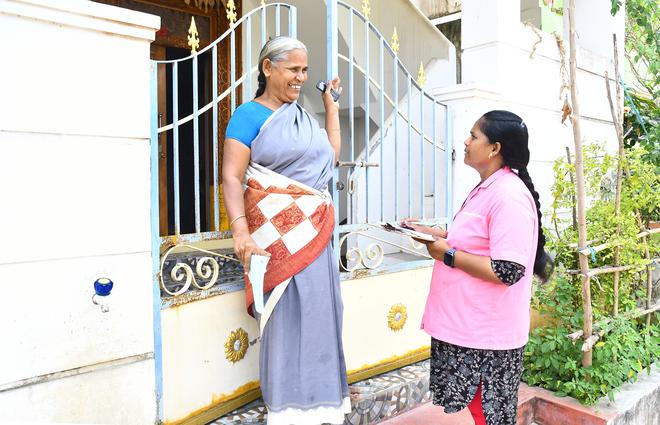
It was in 2018 when a team from the Villupuram Cancer Education and Screening Centre arrived at their village in Koothampakkam panchayat, Kandamangalam block, and organised a screening camp, that their journey towards finding an answer to Rukmani’s pain began. A doctor and nurse knocked on their door, asking her to come for a check-up at the camp. She was diagnosed with early cervical cancer, and was treated by doctors of the Cancer Institute (WIA), Adyar in Chennai.
Breast, Cervix and Oral cavity cancer statistics for 2018 in Tamil Nadu
| Site | Crude Incidence Rate (CIR) per 1,00,000 population |
| Breast | 27.0 |
| Cervix | 17.7 |
| Oral cavity* | 16.0 |
*Oral cavity cancer - lip, tongue, mouth together
Source: Tamil Nadu Cancer Registry Project report, 2018 Cancer Institute (WIA)
Since then, she has been on regular follow-ups with the team in Villupuram. “I also regularly receive calls from the team and they inquire about my health,” she says.
Nearly six kilometres away, in a quiet neighbourhood of the Thanthai Periyar Transport Employees Nagar in Kandamanadi panchayat, Koliyanur block, live Kamatchi* and her husband. A breast cancer diagnosis at the age of 42 came as a rude shock to the couple. It took them nearly six months and repeated house visits and phone calls to seek medical care. “The year was 2016. I was diagnosed with breast cancer following a screening camp here. The treatment -- surgery followed by chemotherapy and several cycles of radiation -- took almost six months. I was always dizzy, unable to eat and had bouts of vomiting but my husband did not leave my side,” says Kamatchi. Even as her eyes well up, Kamatchi says she is keen on staying strong: “We should fight cancer without fear, and getting treated on time is important.”
Cancer diagnosis may have changed the lives of Rukmani and Kamatchi but without the organised screening that ensured timely diagnosis and treatment, it would be difficult to say what might have happened to the two women from Villupuram district.
The Villupuram Cancer Education and Screening Centre is an initiative of the Cancer Institute, Adyar, Chennai, a non-profit cancer treatment and research centre. Cancer Institute is also a Regional Centre for Cancer Research and Treatment, and recognized as the State Cancer Institute, the apex body in Tamil Nadu. Over the past seven years, including during the Covid-19 pandemic disruption of 18 months, the team from Cancer Institute’s satellite cancer screening centre in Villupuram made inroads into taking population-based breast, cervical and oral cancer screening to the people, reaching a total of 61,799 women in Villupuram taluk alone, registering a net coverage of 53.2%.
Cancer Institute’s Villupuram Satellite Screening Centre
Outcomes
This initiative has now been scaled up in Pudukkottai, Tiruvannamalai, Sivagangai and Ramanathapuram districts and has moved to the next taluk in Villupuram district, Thiruvennainallur.
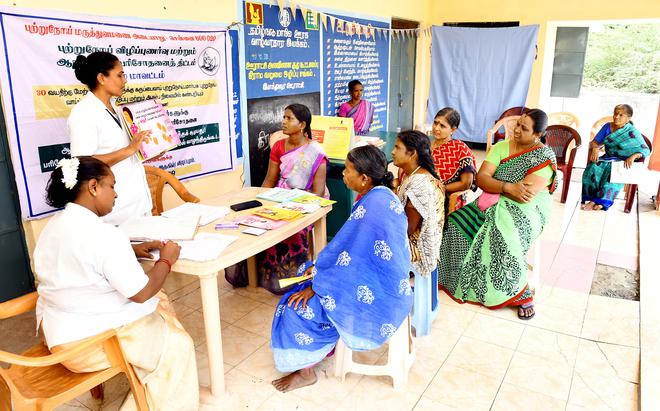
Meanwhile, Tamil Nadu’s Health department in November 2023, launched a population-based cancer screening programme in four pilot districts: Erode, Ranipet, Tirupattur and Kanyakumari, through 606 screening units.
“The Villupuram project was initiated in 2015 with CSR funding of ₹5 crore from Infosys Foundation,” Malliga J.S., head of preventive oncology at Cancer Institute (WIA), Adyar, said. The one-time grant was utilised to conduct this demonstration project and its successful implementation has led to the scaling-up of the project to four more districts (Pudukkottai, Tiruvannamalai, Sivaganga and Ramanathapuram) that are supported by the Cancer Institute Foundation, she says.
“When we started the programme, the screened women who tested positive had to come all the way to Chennai for diagnosis and treatment. Now, with improved facilities like colposcopy and breast imaging services at district-level medical colleges, we are able to refer them to local facilities. This has improved the compliance to diagnosis and treatment,” she says.
How important are organised community-based screenings for a State like Tamil Nadu? T. S. Selvavinayagam, Director of Public Health and Preventive Medicine, explains, “Currently, most cancers are diagnosed at late stages both in India and in Tamil Nadu. Rough estimates say that almost 60% of cases get diagnosed only in stages three and four. Organised cancer screening will enable diagnosing patients earlier, so that there is less suffering to the individual and almost complete care and cure may be possible.”
Vidhya Viswanathan, Deputy Director (NCD and Immunisation), Directorate of Public Health and Preventive Medicine pointed out that a non-communicable disease (NCD) screening programme has been ongoing in the State for the past 20 years. “Cancer screening is being done at all primary health centres, government hospitals and medical college hospitals. But this is opportunistic screening, meaning whoever comes to a facility is tested. Now, an organised community-based screening has been rolled out as a first step towards reaching out to all women. In door-to-door visits, Women Health Volunteers hand over invitations to women and men with their names written on them, and motivate them to come to the screening units and get screened. For women aged 30 and above, breast and cervix screening is done, while oral cancer screening is done for all above the age of 18, she explains.
The Health Department subsequently increased the number of screening units in these four districts by adding 334 health and wellness centres. This was to avoid long hours of travel for women, she adds. At these units, Visual Inspection with Acetic Acid (VIA) is done for cervical cancer screening, and if found positive, the women are referred to the government hospital/medical college hospital for a colposcopy.
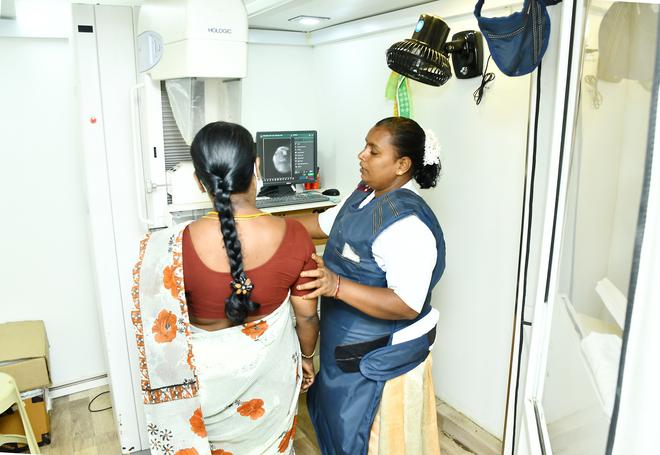
Data showed that invitations were given to 2,49,961 women for breast and cervical cancer screening, of which 78,402 were screened for breast cancer and 59,670 for cervical cancer. “The response is good, and about 30 to 40% of our first-year target group has reached a health facility as of now. We continue to motivate the others to get screened,” Dr. Vidhya says.
Dr. Selvavinayagam adds: “We expect almost every woman who receives the invitation card to come and participate in the screening at the earliest, and those with suspected symptoms to go to a higher centre for confirmation. There is a little gap in this which we hope to bridge in the coming days with regular follow up. As of now, the initiative is highly successful. This type of organised screening, as far as I know, has not been attempted in any other State so far.”
The health workers behind the scenes
At the heart of these population-based screenings lies the role of several field staff members. Take the Cancer Institute’s team for instance. Reaching out to the rural pockets of Villupuram has been no easy task. A number of them recalled how residents used to shy away from screening teams, and how some asked the teams not come home or not come in hospital uniforms so that information on their cancer diagnosis does not spread in the neighbourhood, indicating the stigma still associated with the disease.
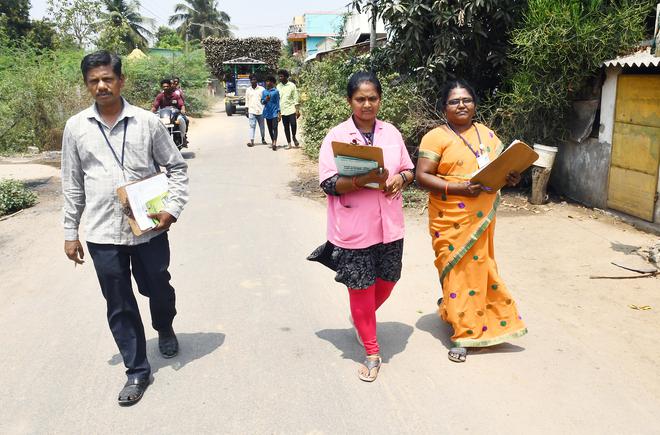
The teams, however, have their daily tasks charted out: travelling in an ambulance to the designated campsite every morning, they pack all utilities such as test kits, window curtains, examination beds, folding tables and chairs. Prior to the camp day, they make sure that the residents are informed and made aware.
Door-to-door visits form the core of these screenings. At one such camp held at the gram sabha building of Elandurai panchayat, nearly 35 kilometres from the Villupuram Government Hospital, social workers G. Periyanayagi and K. Sudha, armed with a bunch of pamphlets, sheets of papers and registration cards attached to clipboards, knock on the door of every house unmindful of the searing sun. They explain patiently, even repeating their lines, to take the message of the screening initiative, loud and clear to the women they meet.
“When compared to 2016, the awareness levels have improved though some still fear coming for check-ups. We take up house visits twice during the camp; first in the morning and then again in the afternoon to motivate all to take part,” Ms. Sudha said.
While the camp is in session, nurses and social workers run the registration area and send the women, after obtaining their informed content and collecting their details, to the makeshift clinic where they undergo breast and cervical examinations. “At present, screening for cervical cancer is done with a simple test, VIA, and examining the cervix for abnormal findings. Screening the cervix for the presence of high risk Human Papillomavirus, the HPV DNA test, is an objective method to detect pre-cancers and cancers. According to research studies, it has been established that a woman above 30 years of age, negative for HPV infections, has very little chance of getting cervical pre-cancer or cancer in the subsequent five to 10 years. A woman who has an HPV infection can be evaluated, and if precancerous changes are present, they can be easily treated and cervical cancer can be prevented,” Dr. Malliga explains.
Dhanuraja Velusamy, assistant professor, department of preventive oncology, Cancer Institute, adds how a planned mop-up in parts of Thiruvennainallur taluk led to an increase in coverage. “We started the screening here in June 2022, and have reached a coverage of around 50 to 55% so far. We are doing a mop-up, and started to reach out to women including those who leave early for work at 6.30 a.m. Through this, our coverage has increased to 60%,” he said.
Recommendations of State-wide cross-sectional survey
The way forward
Dr. Malliga says that many developed and developing countries have started implementing primary HPV DNA screening as their first test to check for cervical cancer. “An effective implementation of HPV DNA testing and HPV vaccination has great potential to reduce the incidence of cervical cancer,” she says.
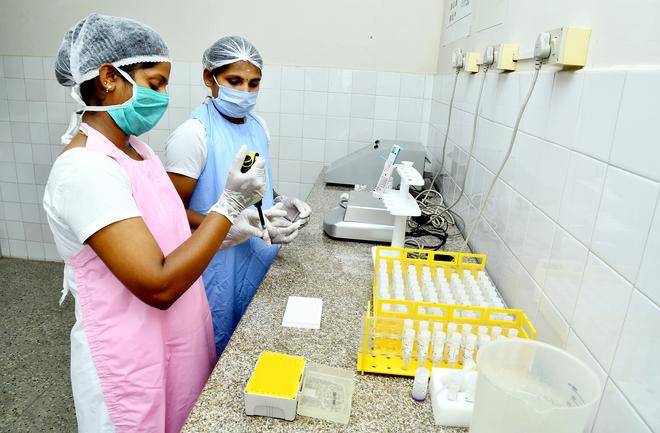
While HPV DNA screening is more accurate, there are constraints in implementing it at the primary care level, a T.N. health official said, adding: “It needs to be done at least at the tertiary care level to start with.”
Awareness is the key for better reach and sustained follow-ups, Dr. Velusamy says, adding. “Community-based screening along with HPV vaccination is the way ahead to prevent cervical cancer. The World Health Organization has set the 90-70-90 strategy, aiming to eliminate cervical cancer by 2030; vaccinate 90% of girls by the age of 15 years, screen 70% of women and treat 90% of those with cervical disease,” he notea.
Dr. Malliga sums up how their efforts have started to pay off though there are challenges and a long way ahead. “Through the Villupuram model, we have demonstrated that organised screening for two common cancers in women (breast and cervix) and oral cancers in both men and women is feasible, though there are challenges such as participation of all eligible persons. In an organised screening initiative, there is sustained awareness, and this is the way forward for early detection and prevention. When such screenings are widely done, the coverage will increase, leading to cancer control,” she said.
*Names have been changed to protect identities







